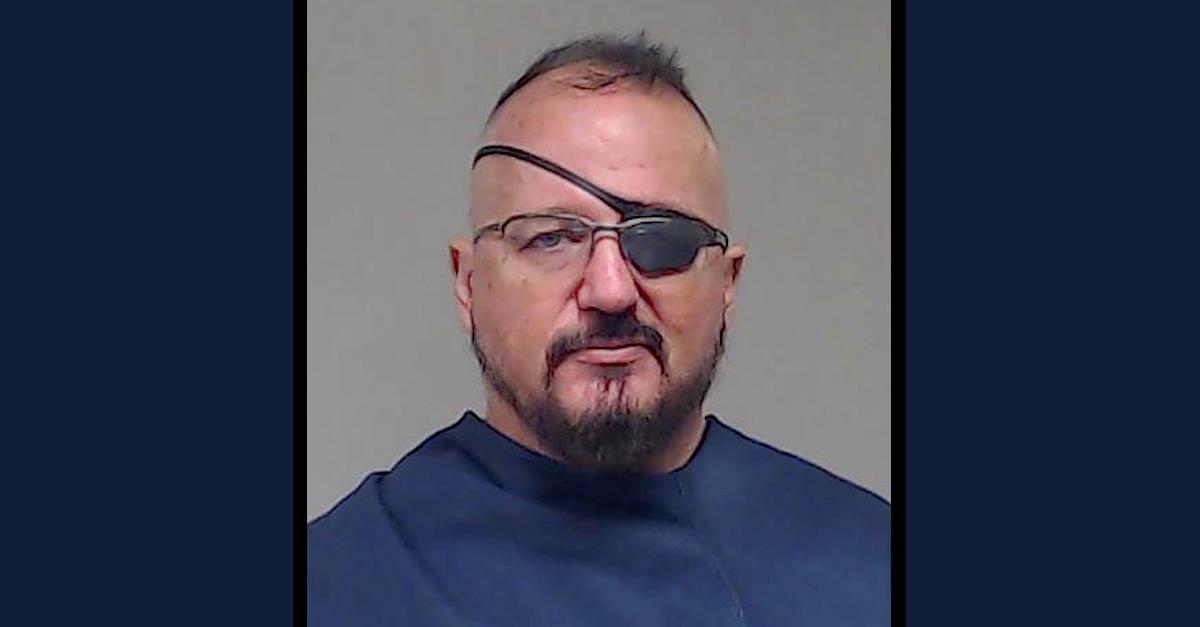
‘Oath Keepers’ leader Stewart Rhodes appears in a Collin County, Texas jail mugshot.
Stewart Rhodes, the founder of the Oath Keepers militia group accused of seditious conspiracy in connection with the Jan. 6 attack on the U.S. Capitol, is a “clear and convincing danger” who must stay behind bars pending trial, a second federal judge has ruled.
Rhodes, 56, has been in custody since his arrest in January, after a U.S. Magistrate Judge in Texas deemed him to be a “credible threat” to the public. Prosecutors say Rhodes has weapons caches and unregistered cars stashed in multiple locations, and that he saw Jan. 6—when hundreds, and possibly thousands, of Donald Trump supporters overran police at the U.S. Capitol to block Congress from certifying Joe Biden‘s win in the 2020 presidential election—as “an initial skirmish or battle in a larger war.”
Prosecutors say Rhodes and other Oath Keepers planned to bring years of military experience and a variety of weapons to support the pro-Trump mob, going so far as to prepare for ferrying a trove of firearms and other weapons across the Potomac.
“My observation at this point [is] if the conduct alleged is true, the danger that it poses cannot be [overstated],” U.S. District Judge Amit Mehta said at the start of Rhodes’ bond hearing Friday, signaling his intention to keep Rhodes in behind bars.
Mehta said that the government hadn’t convinced him that Rhodes is a flight risk, but they won on their arguments that he posed a risk of future dangerousness to the general public. He pointed out that Rhodes spent thousands on weapons and other equipment on the way to D.C. ahead of Jan. 6, and then also made “substantial purchases” of weapons afterwards.
“The concern to me is not that Mr. Rhodes has a Second Amendment right,” Mehta said. “The concern to me is the quantity and timing [of] when Mr. Rhodes made those purchases.”
Mehta: Rhodes Isn’t Being Prosecuted for ‘Just Speaking’
In addressing Rhodes’ argument that he was engaging in speech protected by the First Amendment, Mehta didn’t mince words.
“If anybody thinks that this is about speech, they are mistaken,” Mehta said, noting that Rhodes isn’t accused of “just speaking”: he’s accused of taking action to disrupt the Electoral College certification process, possibly with violence, and the complaint listed a number of “overt acts” in furtherance of that goal.
In support of his request to be released from jail, Rhodes has argued that the preparations and so-called “Quick Reaction Force,” or QRF, teams were merely protective measures in case Trump invoked the Insurrection Act.
Mehta said Friday that while it appears that Rhodes and the Oath Keepers “did provide some protection” at Trump’s “Stop the Steal” rally, the fact that the group headed toward the Capitol undercuts Rhodes’ argument that the Oath Keepers’ presence was merely defensive.
Rhodes had also argued that he did not give the order to a group of Oath Keepers, led by co-defendant Kelly Meggs, to approach the Capitol in a “stack” formation, a military tactic used to move through masses of people. Rhodes said that the group moved on its own.
Mehta didn’t buy it.
Noting that the Oath Keepers is a hierarchical organization, that follows a military-style chain of command, Mehta said that it’s “unlikely” that Rhodes “didn’t, at a minimum, know about, if not encouraged, if not ordered” the approach.
Mehta also said Rhodes’ timeline—that the Oath Keepers headed to the Capitol to provide medical support for Ashli Babbitt, who was fatally shot by a Capitol police officer as she tried to climb through a shattered window into the Speaker’s Lobby—didn’t add up.
“She wasn’t shot until after Mr. Meggs and the ‘stack’ moved toward the Capitol building,” Mehta said.
Mehta: Rhodes Is a ‘Sophisticated’ Person Who Can Avoid Detection
Rhodes had proposed being released into the custody of cousins in California, where he would stay in a “back house” on the property that reportedly doesn’t have internet access. Mehta, a Barack Obama appointee, had appeared to be considering that option at Wednesday’s hearing, but on Friday he said that even under close supervision, Rhodes could potentially outsmart those responsible for keeping him in compliance.
Mehta, who repeatedly referred to Rhodes as a “sophisticated” person who knows how to avoid detection, said that there is “simply no way” that the custodians could ensure that Rhodes would follow the rules of pretrial release. He could, for example, find a way to access encrypted messaging devices without his cousins’ knowledge, Mehta said.
Previously, Mehta said that if he were to grant Rhodes’ release request, Rhodes would be under strict conditions, including 24-hour house arrest. He wouldn’t be allowed to access the internet, or leave the house to work at a job.
It would be “about as strict as it gets without being behind bars … nothing that would resemble somebody having his ordinary freedoms,” Mehta had said.
Tasha Adams, Rhodes’ estranged wife, told Law&Crime on Wednesday that she was “very nervous” that Rhodes may be released. Adams has said that she fears Rhodes, who she said has physically abused her and at least one of their kids, may take the couples’ six children.
Adams also said that the cousins in California can’t be relied upon to keep Rhodes in line.
“His potential custodians are avid Trump supporters,” she said in a text message. “The cousin live streamed Oath Keeper events. The parents are insane [R]epublicans who fully support Stewart in all his activities.”
Earlier on Friday, Mehta advanced three lawsuits seeking to hold former President Donald Trump liable for a variety of claims in connection with the Jan. 6 attack, including alleged violations of the Ku Klux Klan Act. The Oath Keepers, a co-defendant in that litigation, also lost a motion to dismiss the case.
Adam Klasfeld contributed to this report.
[Images via FBI court filing/Collin County, Tex. Jail.]